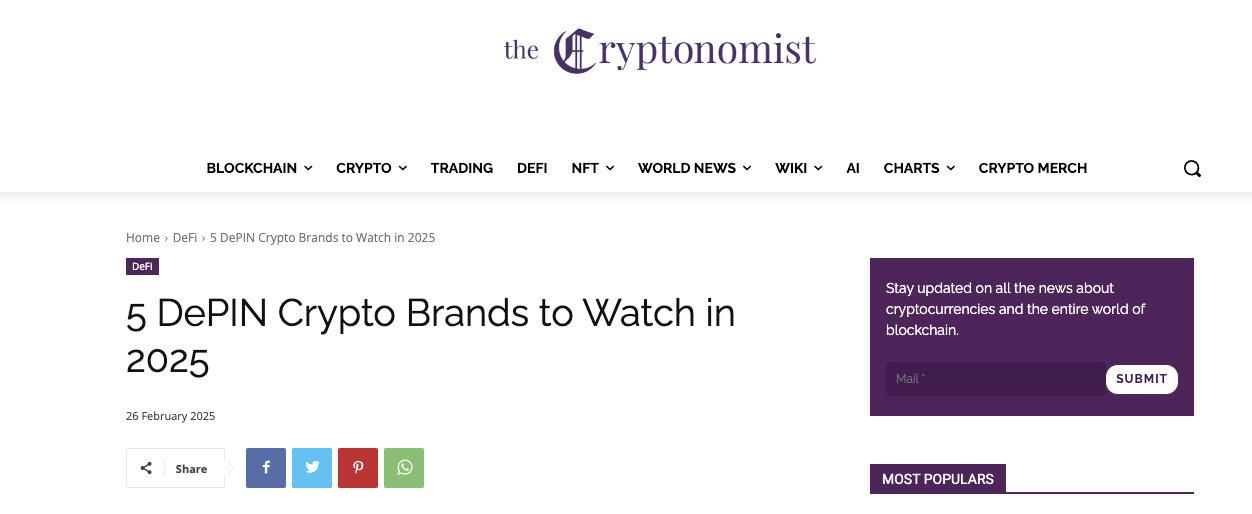Latest DePIN News
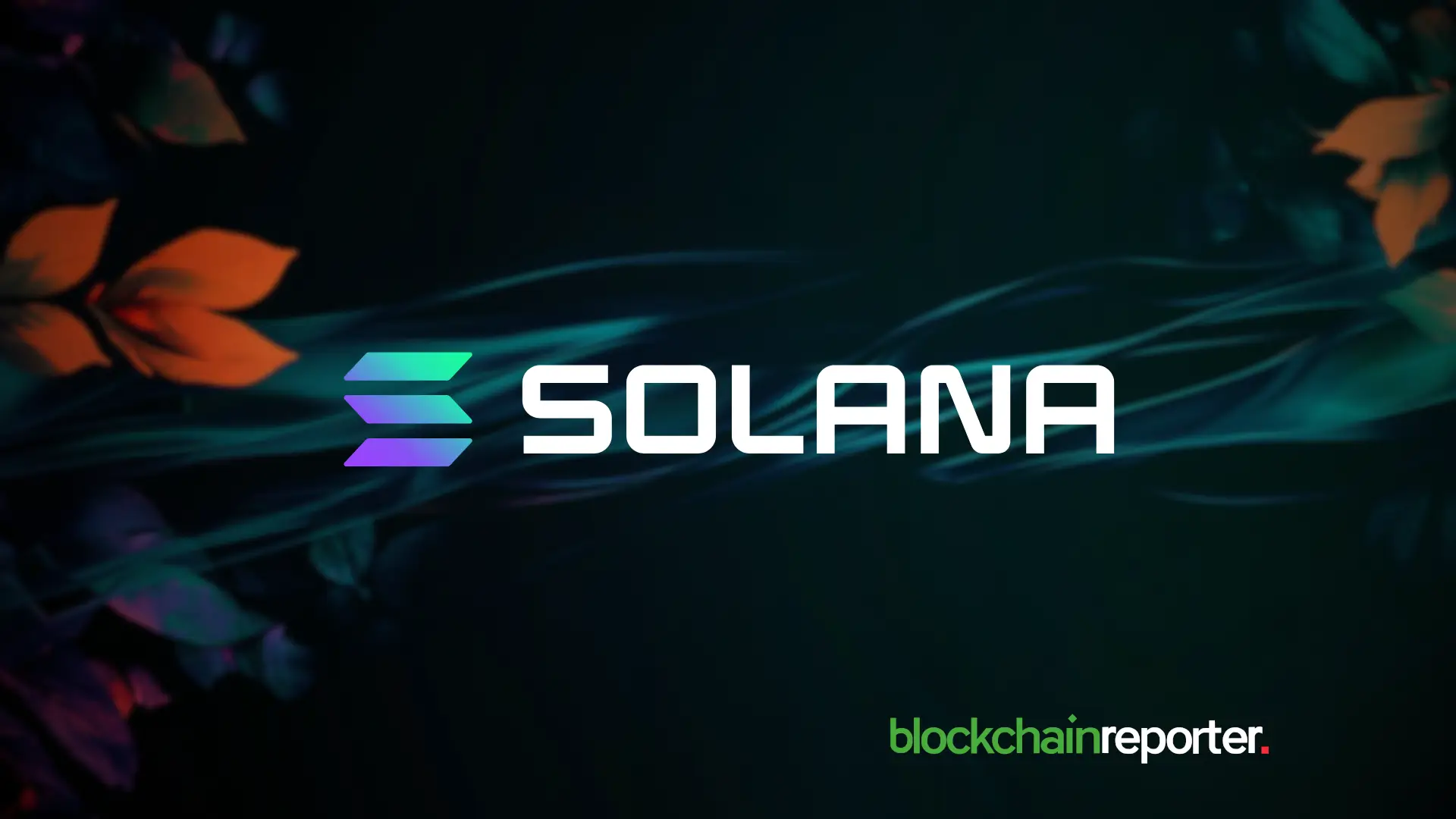
7 months ago
Coldware (COLD) Aims for $200 Million Presale, Challenging Solana in DePIN Sector
Coldware (COLD), an emerging Layer-1 blockchain project, is making waves in the decentralized infrastructure (DePIN) sector with plans to raise $200 million in its presale. This ambitious funding goal positions Coldware as a potential leader in Real-World Asset (RWA) tokenization and Web3 infrastructure, directly competing with established platforms like Solana. The project aims to leverage its scalable technology and the newly introduced DePIN Mobile initiative to facilitate massive adoption and transform how assets are tokenized and managed on the blockchain.
One of the standout features of Coldware is its DePIN Mobile initiative, which seeks to revolutionize Web3 mobile devices. Unlike traditional blockchain networks that focus primarily on decentralized finance (DeFi) and non-fungible tokens (NFTs), Coldware is creating a framework that integrates seamlessly with mobile technology. This innovative approach aims to enable secure peer-to-peer communication, decentralized storage, and real-time on-chain applications, all while eliminating the need for centralized cloud services. By utilizing a high-speed consensus mechanism, Coldware is set to process transactions more efficiently than existing Layer-1 networks, attracting the attention of institutional investors and tech firms.
As Coldware's presale unfolds, it is drawing significant interest from venture capital firms and institutional investors who are eager to tap into the $10 trillion market for tokenized real-world assets. The project’s unique proposition allows for the fractional ownership of various physical assets, creating new investment opportunities for both retail and institutional players. While Solana faces challenges with liquidity and declining decentralized exchange activity, Coldware is rapidly building a robust ecosystem that could redefine the DePIN and RWA sectors. Investors are keenly observing this presale, as its success could herald one of the most disruptive blockchain projects of the decade.

7 months ago
Zuvu AI and Vana Partner to Enhance Decentralized AI in Bittensor
On February 26, Zuvu AI and Vana announced a strategic partnership aimed at enhancing decentralized artificial intelligence within the Bittensor ecosystem. This collaboration seeks to create a more open and financially sustainable AI environment by integrating various layers of the decentralized AI stack. Zuvu AI, formerly known as SocialTensor, brings valuable experience from scaling four Bittensor (TAO) subnets, while Vana contributes its innovative user-owned data network, recently advised by Binance founder Changpeng Zhao. Together, they aim to test a new model of AI development that emphasizes collaboration and sustainability.
Art Abal, Managing Director at Vana Foundation, highlighted that the partnership effectively integrates Vana’s data layer, Bittensor’s subnet network, and Zuvu’s economic layer to enhance Vana’s DataDAO ecosystem. This integration addresses significant challenges in AI development by allowing models, agents, and data to be invested in, staked, traded, and monetized. With the AI market projected to reach trillions by 2032, this collaboration positions itself to create new opportunities in a rapidly expanding market, as Zuvu powers the AI economy layer.
The partnership's strategic integration into Bittensor leverages its incentive-driven network to scale AI development effectively. By merging user-owned data with permissionless computing and economic incentives, this collaboration reflects the disruptive nature of decentralized finance (DeFi) in traditional finance. The partnership is expected to enhance the diversity of Bittensor’s subnets, support the expansion of Vana’s DataDAO, and establish Zuvu as a leader in AI financialization, potentially influencing industry practices. This initiative aligns with the growing trend toward open-source artificial intelligence and responds to the demand for alternatives to centralized AI giants.

7 months ago
Fluence Launches DePIN Pledge to Promote Decentralized Infrastructure
Fluence has launched the DePIN Pledge, urging cryptocurrency firms and industry players to commit to utilizing decentralized physical infrastructure network solutions. This initiative is supported by prominent organizations such as IoTeX, Polygon, Helium, and Consensys. Fluence aims to encourage projects to publicly embrace decentralized infrastructure, fostering more transparent and resilient ecosystems. As the web3 and cryptocurrency landscape evolves, the importance of maintaining decentralization has become increasingly critical, especially in light of the growing reliance on centralized infrastructure by many projects.
The DePIN Pledge allows firms that commit to it to be listed in a public directory on the DePIN Pledge website, enabling users and traders to identify and support companies that prioritize decentralization. Additionally, participating projects will receive a manifesto and a DePIN Pledge NFT, which is auditable on the Ethereum blockchain. This NFT serves as a symbol of their commitment to decentralization and can be showcased across various platforms and social media channels. Major crypto firms, including Infura, Outlier Ventures, and Blockscout, have also backed this initiative, highlighting a collective effort towards a decentralized future.
Tom Trowbridge, Co-Founder & CEO of Fluence, expressed enthusiasm for the pledge, noting that it marks the beginning of DePIN adoption. He anticipates a diverse range of DePIN products and services emerging in the coming years. Clemens Wan, global solutions architect at Consensys, echoed this sentiment, emphasizing the need for decentralized infrastructure that aligns with the core values of web3. The DePIN Pledge represents a significant step towards ensuring that the foundational services of the industry reflect the principles of decentralization, ultimately realizing the full promise of web3.
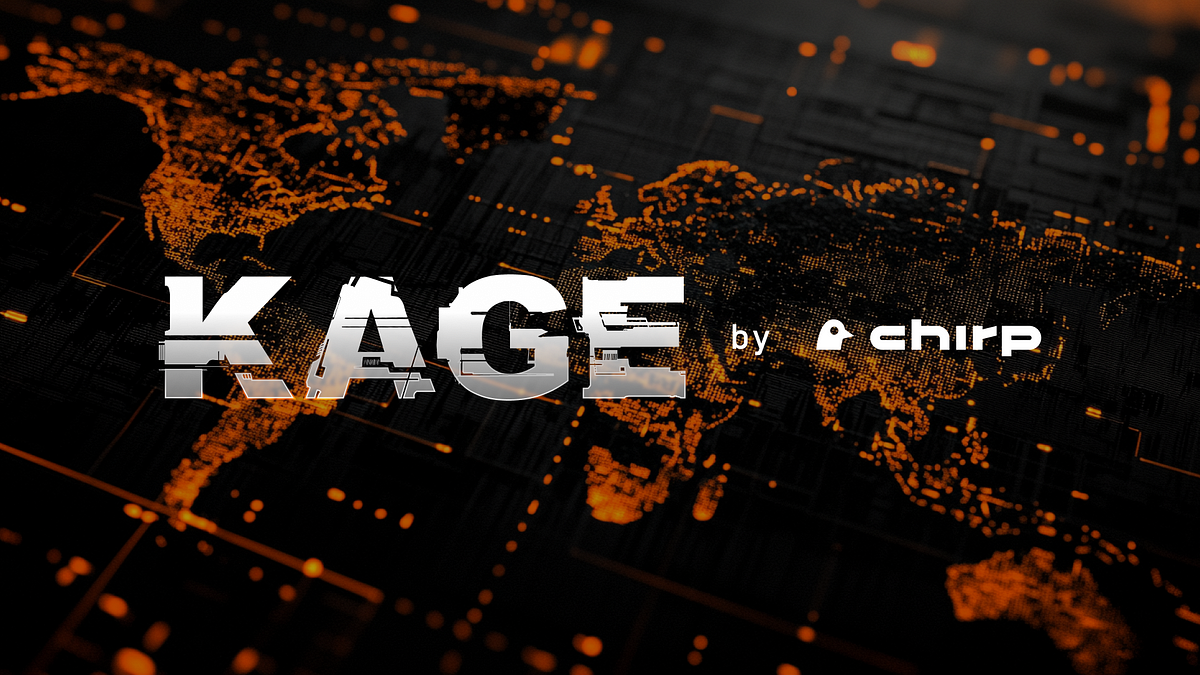
7 months ago
Kage App: Revolutionizing Geolocation with DePIN Technology
The Kage App by Chirp is making waves in the Web3 gaming landscape as the world's first DePIN (Decentralized Physical Infrastructure Network) game with real-world utility. Users can earn rewards by contributing to a crowdsourced geopositioning database, which has already seen impressive engagement. In just three months, from November 2024 to February 2025, users have scanned over 2 billion unique networks, including 481 million Wi-Fi hotspots and 25 million cell towers. This rapid growth starkly contrasts with traditional Web2 competitors like WiGLE, which took 19 years to reach a mere 551 million networks.
The foundation of Kage lies in the concept of wardriving, where users scan for wireless networks while moving through an area. Chirp has gamified this activity, transforming it from a niche practice into a community-driven initiative that builds a decentralized location database capable of replacing GPS in various applications. Unlike many Play-to-Earn games that lack real utility, Kage focuses on creating a geolocation system that can function effectively without reliance on GPS, particularly in areas where traditional systems fail, such as indoors or during GPS jamming.
Chirp's geolocation database leverages various wireless signals, including Wi-Fi, cell towers, and Bluetooth, to estimate device locations. This innovative approach not only enhances navigation in challenging environments but also opens up new possibilities for applications in military, IoT, and child safety. As Chirp continues to expand its database, it is poised to capture a significant share of the projected $472 billion GPS market by offering a decentralized and more efficient alternative. Kage is not merely a game; it represents the dawn of a new era in location technology, emphasizing community involvement and real-world applications in the process.
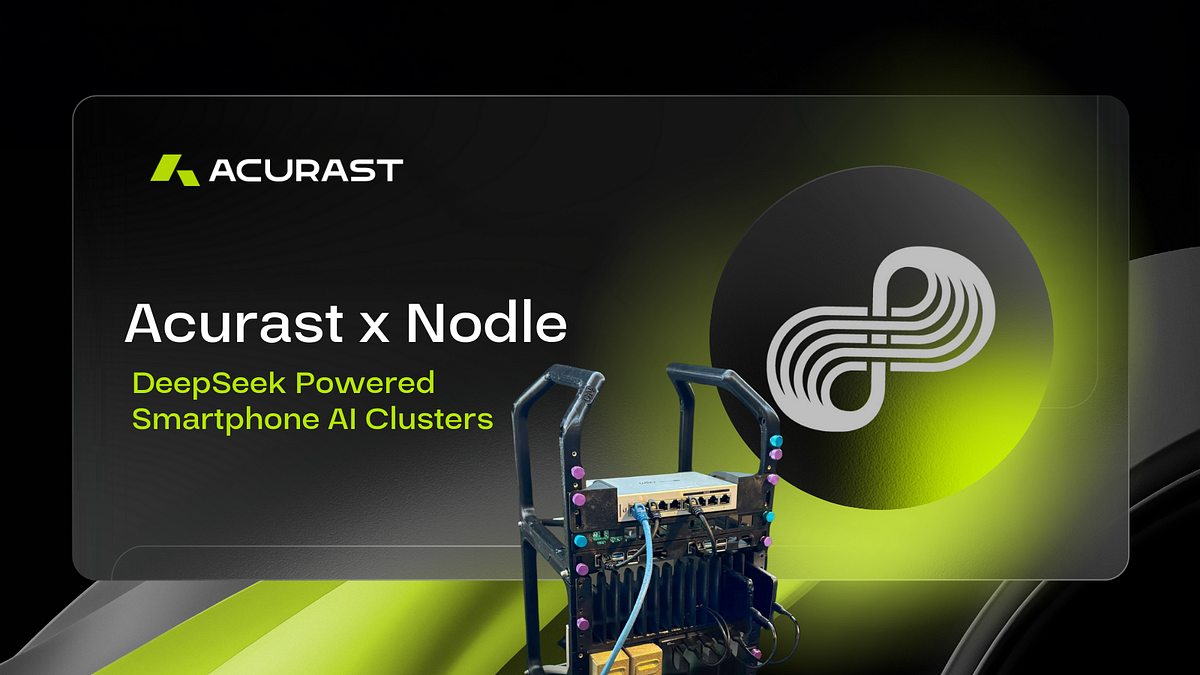
7 months ago
Acurast Integrates with Open Node Project to Enable Decentralized AI Clusters
Acurast has announced an exciting integration with the Open Node Project (ON), a collaborative open-source initiative developed alongside Nodle. This project aims to empower individuals to create decentralized AI clusters using repurposed smartphones, significantly enhancing self-sovereign computing and decentralized infrastructure (DePIN). By transforming old smartphones into AI compute nodes, Acurast leverages ARM processors and Trusted Execution Environments (TEE) to allow developers to efficiently deploy large language models (LLMs) such as DeepSeek AI.
The deployment process for an Acurast AI cluster is straightforward. Users need to gather smartphones equipped with ARM processors and TEE, connect them to power sources, USB hubs, and networks, and install the Acurast app from GitHub. After enabling USB debugging and registering each device, developers can deploy AI models and monitor their performance through the Acurast Dashboard. This innovative approach not only democratizes access to AI computing but also fosters a truly decentralized and scalable compute network powered by smartphones.
The significance of this integration lies in its potential to provide cost-effective AI solutions while eliminating reliance on centralized servers, thus promoting digital sovereignty. Acurast is at the forefront of decentralized computing, ensuring that both developers and users can leverage the power of mobile-driven AI clusters. With smartphones being the most trusted devices globally, Acurast is redefining decentralized compute, making it more accessible and secure than ever before.
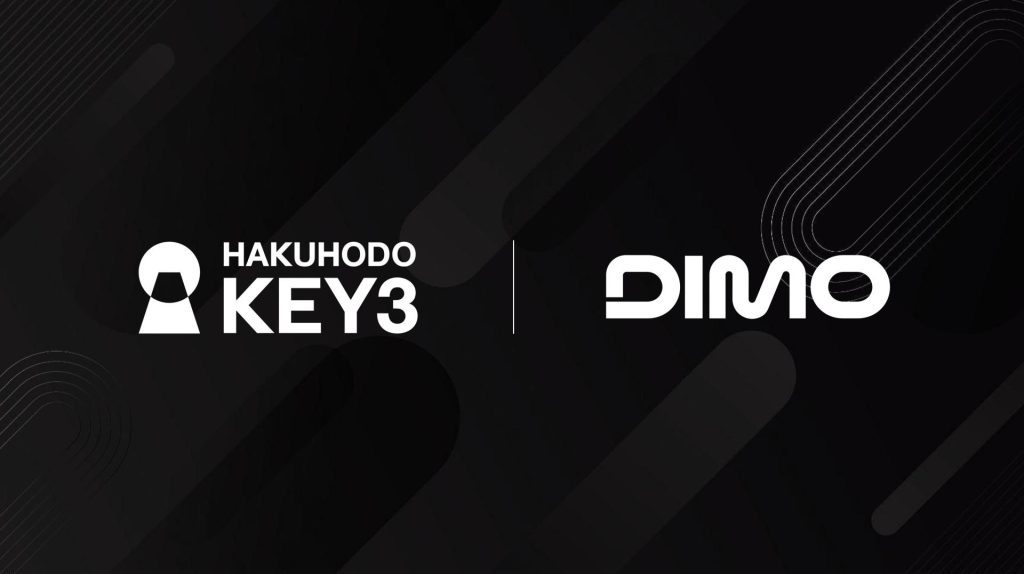
7 months ago
HAKUHODO KEY3 Partners with DIMO to Revolutionize Automotive Data in Japan
On February 26th, 2025, HAKUHODO KEY3 Inc., based in Tokyo, announced a strategic partnership with the DIMO Foundation to enhance the connected car experience in Japan. This collaboration aims to develop innovative products and services utilizing blockchain technology within the automotive sector. DIMO, a DePIN (Decentralized Physical Infrastructure Network) project founded in the US, focuses on addressing challenges in the automotive industry by creating a decentralized ecosystem that interlinks digital and physical infrastructures. This partnership signifies a significant step towards integrating web3 technology into the automotive landscape in Japan.
DIMO's Co-Founder, Alex Rawitz, emphasized the importance of collaboration in building a connected vehicle future, stating that HAKUHODO KEY3's extensive connections within the automotive industry make them an ideal partner. The partnership is expected to facilitate the implementation of DIMO's platform in Japanese vehicles, allowing drivers to connect their cars to a data ecosystem. This initiative aims to provide users with greater control over their vehicles and data, enhancing privacy while creating new services and economic opportunities.
HAKUHODO KEY3's CEO, Toshinori Shigematsu, expressed enthusiasm for the collaboration, highlighting the potential of DIMO's technology to drive mass adoption of web3 solutions. As the automotive industry evolves, this partnership represents a pioneering effort to merge traditional automotive practices with cutting-edge blockchain innovations. Both companies are committed to fostering a seamless integration of web3 technologies, ultimately aiming to improve customer experiences and contribute to the growth of the automotive market in Japan.

7 months ago
PowerPod Revolutionizes EV Charging with AI Technology
As the electric vehicle (EV) market continues to expand, optimizing charging infrastructure has become crucial to meet user demands while minimizing costs and grid stress. Traditional charging methods often lead to peak load issues and price fluctuations, making it essential to implement innovative solutions. PowerPod aims to tackle these challenges through AI-powered charging stations that intelligently adjust based on real-time data, including power grid conditions, electricity prices, and user preferences. This approach not only enhances efficiency but also provides a cost-effective solution for both users and energy providers.
The AI model developed by PowerPod incorporates various data inputs to optimize charging strategies. It analyzes charging station data, grid load levels, user behavior, and environmental factors such as weather conditions. By utilizing Long Short-Term Memory (LSTM) neural networks, the model predicts future energy demand, allowing charging stations to schedule EV charging during the most cost-effective and grid-friendly times. Additionally, Deep Reinforcement Learning (DQN) is employed to dynamically adjust charging rates based on real-time conditions, ensuring that users receive the most efficient charging experience while minimizing costs.
PowerPod's AI-driven smart charging system architecture consists of data collection, AI processing, execution, and continuous learning. This innovative approach has been tested in a citywide EV network, yielding promising results. Looking ahead, PowerPod plans to integrate blockchain technology for secure billing, offer personalized charging modes, and collaborate with autonomous driving technologies to create self-operating charging stations. These advancements signify a transformative shift in the EV charging landscape, paving the way for a more sustainable future in the decentralized Web3 ecosystem.
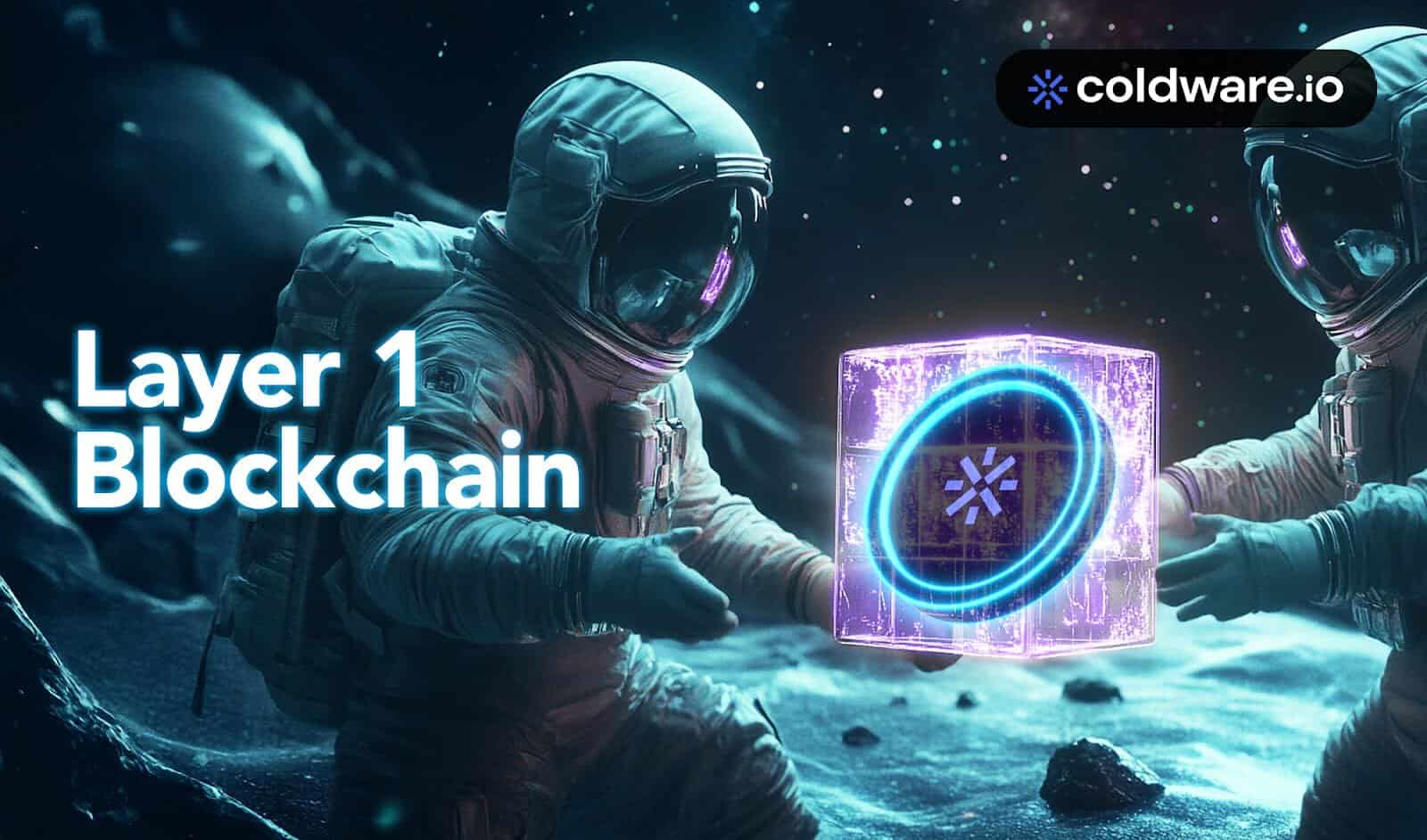
7 months ago
Coldware and Render: Key Players in the DePIN Sector
The decentralized physical infrastructure network (DePIN) sector is witnessing significant developments, particularly with two standout projects: Coldware (COLD) and Render (RENDER). Coldware is redefining the integration of blockchain with real-world asset (RWA) tokenization and payment finance infrastructure, while Render focuses on revolutionizing distributed GPU rendering. As the Web3 landscape evolves from mere speculation to practical applications, both projects are positioned for substantial growth, potentially achieving a remarkable 5000% surge in the coming years.
Coldware (COLD) is at the forefront of the next evolution in DePIN and Web3 utility, expanding its influence beyond GPU distribution. It is introducing blockchain-integrated hardware devices, such as smartphones and digital wallets, aimed at creating a decentralized financial ecosystem. This innovative approach not only enhances the utility of blockchain technology but also facilitates the tokenization of RWAs and the development of PayFi solutions, which are essential for mainstream adoption.
On the other hand, Render (RENDER) has established itself as a leader in decentralized GPU computing, connecting digital artists and developers with distributed GPU power. By allowing users to monetize their idle GPU resources in exchange for RENDER tokens, the platform has garnered significant partnerships with major industry players. However, as competition within the DePIN ecosystem intensifies, Coldware's comprehensive infrastructure model may provide it with a competitive edge. The question remains whether Coldware will surpass Render in the anticipated 5000% growth, as it integrates blockchain into everyday life, potentially driving the next wave of decentralized adoption.
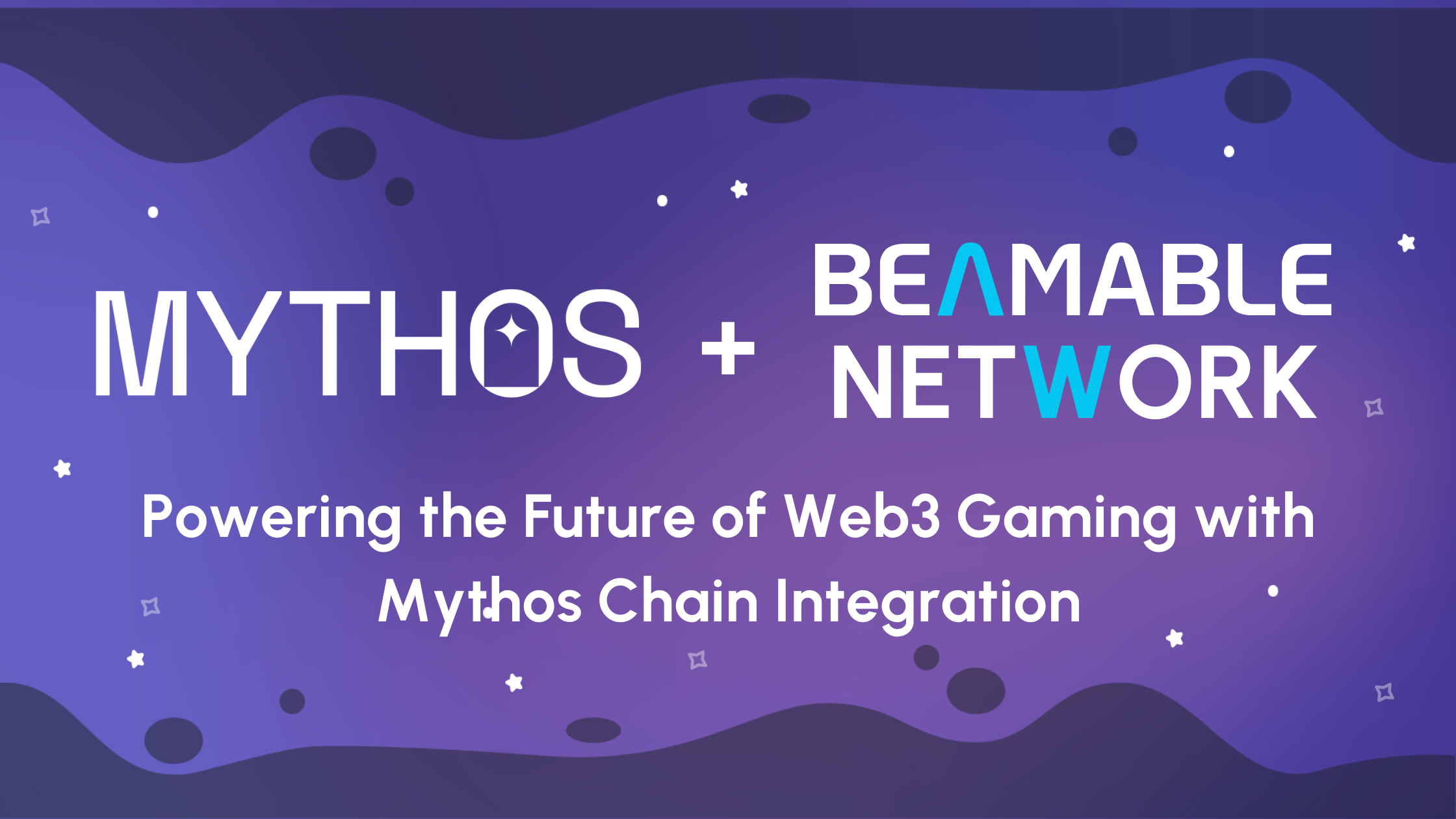
7 months ago
Beamable Integrates Mythos Chain for Enhanced Web3 Gaming Experience
Web3 gaming is experiencing rapid evolution, necessitating developers to have access to scalable and decentralized infrastructure that can support immersive, player-driven economies. In response to this demand, Beamable Network has announced its native support for Mythos Chain, providing developers with an out-of-the-box solution for seamless integration of Mythos tokens. This initiative, unveiled at ETH Denver 2025 and backed by Scytale Digital, aims to leverage Polkadot's scalability and interoperability to enhance the capabilities of game developers in the Web3 space.
The integration of Mythos, a Polkadot-based chain, offers game developers the speed, security, and cross-chain compatibility essential for creating next-generation Web3 games. By incorporating native support for Mythos tokens, Beamable simplifies the blockchain implementation process, allowing studios to effortlessly launch and scale their Web3-powered game economies. Jon Radoff, CEO of Beamable, emphasized that this integration will eliminate complexity and empower studios to create engaging and player-driven economies that redefine ownership and interaction in gaming.
Developers utilizing the Beamable SDK for Mythos will benefit from various features, including seamless support for Mythos tokens, plug-and-play blockchain integration, and scalable monetization solutions. To further discuss the future of Web3 game development, Jon Radoff and John Linden, CEO of Mythical Games, will host a live discussion on February 26. They will cover topics such as the vision behind the Mythos SDK integration, the advantages of Polkadot infrastructure for game developers, and strategies for onboarding traditional game developers into the Web3 ecosystem. With this collaboration, Beamable is set to make decentralized gaming more accessible and scalable than ever before.
Signup for latest DePIN news and updates
